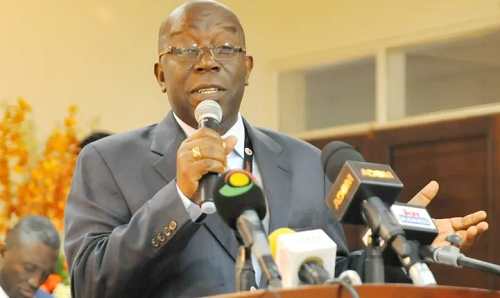
Debate on low benefits: Consider pension during negotiations - SSNIT boss
The Director-General (D-G) of the Social Security and National Insurance Trust (SSNIT), Dr John Ofori-Tenkorang, has proposed a solution to the issue of low pension benefits with a call on labour unions to shift the conversation during salary negotiations from allowances to low insurable incomes (salaries), which affect contributors in their retirement.
He said it was time for labour to critically consider pensions when negotiating for wages and other benefits with the government and other employers.
Advertisement
He also stressed the need for that conversation to also include the need to consolidate allowances with salaries to enable the percentage set aside for one’s pension to reflect what one earned every month as basic salary.
The SSNIT D-G was speaking to the Daily Graphic last Saturday to react to a disclosure about low pension benefits by the National Pensions Regulatory Authority (NPRA).
The NPRA had, last week, said about 53 per cent of the 233,670 pensioners on SSNIT payroll currently received less than GH¢1,000 per month as basic salary.
It also indicated that about 1,669 people were on low pensions of less than GHc300 per month.
Low salary, low benefits
Earlier, when he addressed the 11th National Quadrennial Congress of the Industrial and Commercial Workers Union (ICU) at the University of Professional Studies, Accra (UPSA) last Thursday, Dr Tenkorang had explained that SSNIT had received the flak for the perceived low pensions it paid, but the reality of contributors declaring low basic salaries was never mentioned.
“Often, people talk about how long they have contributed to the SSNIT Scheme, as against the perceived low amounts they receive as pension benefit, but this conversation hardly includes how much they declared to SSNIT as basic salaries or what they paid to the scheme monthly.
“The fact is that the salaries on which one contributes determine the pension that is paid. In short, the factors that determine how much you receive as benefits depend on you – the member,” he stressed.
The D-G noted that if the contributions of workers in active service did not significantly improve, then the reality of their pension payments might not be that different from those who were already on retirement.
SSNIT not to blame
Dr Ofori-Tenkorang, explained that the situation had come about basically because of the amounts that pensioners contributed during their time in employment.
“It is never the making of SSNIT to pay some people low pension benefit and pay others high because there is no mechanism for the trust to discriminate,” he said.
He said it was easy for people to accuse SSNIT under such circumstances, forgetting that many people paid pension contributions on salaries as low as GH¢500 or less, when, in actual fact, they were earning more than that.
“However, they receive larger amounts, most of the time three of four times, as allowances, on which they do not pay any pensions,” he explained.
The statistics
Providing some statistics to buttress his point, Dr Ofori-Tenkorang said: “Over 80 per cent of workers in Ghana receive salaries of GH¢2,500 or less. It means 80 per cent are contributing GH¢275 each month and 95.5 per cent of pensioners are paid GH¢2,500 or less each month.
“Only 5.3 per cent of workers in Ghana pay premium on salaries of GH¢5,000 or more. On the other hand, 1.4 per cent of pensioners also receive GH¢5,000 and above as monthly pension.”
Based on the trend, he warned that should that remain unchanged, 80 per cent of retirees would receive pension of GH¢1,500 or less in the future.
The D-G further revealed that the “11 per cent contribution guarantees you up to a maximum of 60 per cent of the average of your three years’ best annual salaries, depending on the number of years you have contributed”.
“So for a three-year average best salary of GH¢3,000, you are guaranteed a monthly pension up to a maximum of GH¢1,800,” he said, adding that “what this tells us is that it is time to shift the conversation from low pensions to low insurable incomes (salaries)”.
Statement of Account
Dr Ofori-Tenkorang advised workers to regularly check if their contributions were being paid and in the right amounts.
He said the trust had made it convenient by providing quarterly statements to all members.
“A good way to avoid being shocked about your benefits on retirement is for members to track and be sure employers are paying contributions regularly and on the correct salaries. That is why we have introduced quarterly issuance of statements to all members.
“If you have not received your statements, then it means we don’t have your valid email address. I will urge you to visit our stand outside and update your contact details, as well as your list of beneficiaries,” he advised the workers at the congress.



